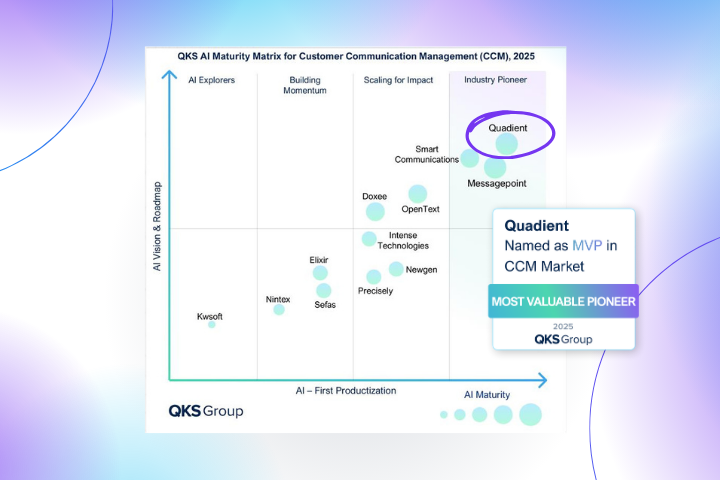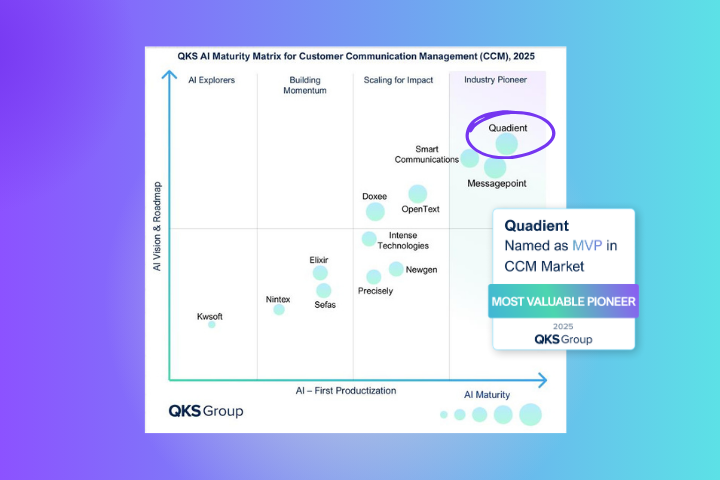
In today's technology-driven business landscape, organizations across all industries are under increasing pressure to stay competitive. One of the most significant enablers of this competition is digital transformation, a process that leverages technology to change how businesses operate and fundamentally deliver value to customers. Among the various areas that can benefit from digital transformation, document automation stands out as a crucial element for simplifying operations, improving efficiency, and enhancing overall business agility. Technology research and advisory firm, Constellation Research, estimates that the overall market for document automation will grow from $6.1 billion in 2023 to $20.1 billion by 2028.
Below, we outline why document automation is one of the biggest drivers of digital transformation for many businesses today.
1. Foundation of workflows
Documents are integral to nearly every business process—legal contracts, financial reports, customer agreements, or invoices. Traditionally, these documents were manually processed, consuming time and resources while prone to errors. As businesses shift towards digital ecosystems, automating document creation, management, and storage becomes a natural first step in modernizing workflows.
By digitizing and automating document workflows, companies lay the groundwork for broader digital transformation initiatives. Document automation often triggers the digitization of other processes, from customer onboarding to supply chain management, leading to greater organizational agility.
2. Scalability and efficiency
In the pre-digital era, scaling business operations meant increasing headcount and infrastructure to handle growing volumes of documents and paperwork. Document automation changes this equation by allowing businesses to handle larger volumes of documentation without needing a corresponding resource increase. Automated systems can process thousands of documents daily, from invoice approvals to contract generation, significantly improving efficiency.
This scalability is essential for digital transformation because it enables businesses to grow without being bottlenecked by manual processes. In a digital economy, where speed and agility are critical to staying competitive, document automation becomes a key enabler of operational efficiency.
3. Accelerating customer and employee experience
Both customers and employees expect fast, efficient, and seamless business interactions. Manual document processing slows down these interactions, resulting in delays and frustration. In contrast, automated document workflows simplify these processes, leading to faster turnaround times and a more user-friendly experience.
This might mean faster processing of loans, insurance claims, or legal agreements for customers. For employees, it results in more time spent on higher-value tasks rather than repetitive administrative work. Document automation, in turn, enhances both customer satisfaction and employee productivity—two critical components of successful digital transformation.
4. Data-driven insights and optimization
For any business, data is one of the most valuable assets. Manual document processes can make it challenging to gather and analyze data effectively. Automating document workflows allows businesses to unlock powerful data-driven insights that help optimize workflows, understand inefficiencies, and track performance metrics. Document automation platforms can collect data on things like turnaround times, compliance adherence, and more. With this data, organizations can continuously improve their processes, helping them work smarter and ultimately driving further digital transformation.
5. Enhancing compliance and reducing risk
Healthcare, finance, and legal industries face stringent compliance regulations when handling sensitive data and documents. Managing compliance is risky and prone to oversight, errors, and costly penalties. Automating document workflows helps ensure compliance protocols are embedded within processes, reducing the likelihood of human error and making audits more transparent.
In digital transformation, document automation enables businesses to reduce risk while scaling up their operations. Automated systems can ensure that documents are correctly formatted, securely stored, and accessible to only authorized personnel while maintaining comprehensive audit trails.
6. Cost reduction and resource optimization
One of the most immediate benefits of document automation is cost savings. Digital transformation is often driven by the need to reduce operational costs while increasing efficiency, and document automation plays a pivotal role in achieving this. The cost of manually processing documents—printing, shipping, filing, and storing—adds up over time. Organizations can significantly reduce overhead costs and better use their workforce by automating document workflows. This creates a more efficient, cost-effective business model that aligns with the broader digital transformation goals.
7. Supporting remote and hybrid work environments
The shift to remote and hybrid work models has accelerated the need for digital solutions that enable distributed teams to collaborate efficiently. In these work environments, document automation becomes essential. Paper-based workflows are not viable for geographically dispersed teams. Document automation platforms allow teams to access, edit, share, and approve documents from anywhere in real-time. This flexibility supports the modern workforce and ensures that business operations continue uninterrupted, further driving digital transformation efforts.
Document automation is more than just a way to reduce paperwork—it is one of the foundational elements driving digital transformation across industries. By improving efficiency, enhancing compliance, providing data-driven insights, and integrating with advanced technologies, document automation unlocks the full potential of digital transformation initiatives. As organizations evolve in a digital-first world, document automation will become more significant, helping businesses stay competitive, agile, and future-ready.
If you're ready to reap the benefits of digital transformation with document automation, contact us here.







